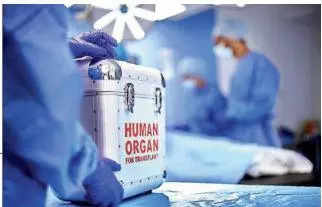Telangana’s adoption of Central Organ Transplant Act to boost donations | Hyderabad News

Hyderabad: With over 5,000 people in Telangana awaiting life-saving organ transplants, the state’s decision to adopt the Centre’s Transplantation of Human Organs Act is expected to significantly improve organ availability.
This move will pave the way for the establishment of multiple non-organ transplant harvesting centres, allowing hospitals without organ transplant licenses — but with the necessary medical infrastructure — to facilitate organ donation from brain-dead patients.
A key reform under the central Act is the expansion of medical professionals authorised to declare brain death. Previously, only neurosurgeons or neurologists could certify brain death, leading to delays in the organ donation process. Now, anesthesiologists and physicians will also be trained and permitted to make this declaration, increasing efficiency and ensuring that more viable organs, particularly livers and kidneys, are available for transplant.
“Currently, we have about 3,000 liver transplant requests and 2,000 kidney transplant requests. The delays in brain death declaration often create disputes between doctors and families, slowing down the process. With these new changes, more organs will become available, allowing more families to save their loved ones,” said a senior health department official.
Until now, organ donations in Telangana have been restricted to hospitals licensed for organ transplants or those affiliated with the govt-run Jeevandan programme. At present, 41 hospitals in Hyderabad, along with govt institutions such as Osmania, Gandhi hospitals, and NIMS, are authorised to perform transplants.
However, several private medical colleges, corporate hospitals, and district-level hospitals also treat critically ill patients who may become potential organ donors. The latest changes will enable these institutions to contribute to the organ donation pool, provided they have trained medical personnel.
“With the necessary training, even district hospitals and private facilities can play a significant role in organ donation,” an official said. Training programmes for physicians and anesthesiologists will be conducted across both govt and private hospitals, ensuring they are well-equipped to handle brain death declarations in a timely manner. Each hospital will designate a certified doctor or a team of doctors for this purpose.
While the Centre passed the Transplantation of Human Organs Act in 1994, the former Andhra Pradesh govt enacted its own version of the law in 1995. Following Telangana’s formation in 2014, the state retained the same legislation, with a name change to the Telangana Transplantation of Human Organs Act, 1995. The adoption of the central Act now aligns Telangana with the national framework, incorporating key amendments made in 2011 and 2014.
This critical policy shift is expected to significantly enhance organ donation rates in the state, potentially saving thousands of lives each year, experts in the field said.
This move will pave the way for the establishment of multiple non-organ transplant harvesting centres, allowing hospitals without organ transplant licenses — but with the necessary medical infrastructure — to facilitate organ donation from brain-dead patients.
A key reform under the central Act is the expansion of medical professionals authorised to declare brain death. Previously, only neurosurgeons or neurologists could certify brain death, leading to delays in the organ donation process. Now, anesthesiologists and physicians will also be trained and permitted to make this declaration, increasing efficiency and ensuring that more viable organs, particularly livers and kidneys, are available for transplant.
“Currently, we have about 3,000 liver transplant requests and 2,000 kidney transplant requests. The delays in brain death declaration often create disputes between doctors and families, slowing down the process. With these new changes, more organs will become available, allowing more families to save their loved ones,” said a senior health department official.
Until now, organ donations in Telangana have been restricted to hospitals licensed for organ transplants or those affiliated with the govt-run Jeevandan programme. At present, 41 hospitals in Hyderabad, along with govt institutions such as Osmania, Gandhi hospitals, and NIMS, are authorised to perform transplants.
However, several private medical colleges, corporate hospitals, and district-level hospitals also treat critically ill patients who may become potential organ donors. The latest changes will enable these institutions to contribute to the organ donation pool, provided they have trained medical personnel.
“With the necessary training, even district hospitals and private facilities can play a significant role in organ donation,” an official said. Training programmes for physicians and anesthesiologists will be conducted across both govt and private hospitals, ensuring they are well-equipped to handle brain death declarations in a timely manner. Each hospital will designate a certified doctor or a team of doctors for this purpose.
While the Centre passed the Transplantation of Human Organs Act in 1994, the former Andhra Pradesh govt enacted its own version of the law in 1995. Following Telangana’s formation in 2014, the state retained the same legislation, with a name change to the Telangana Transplantation of Human Organs Act, 1995. The adoption of the central Act now aligns Telangana with the national framework, incorporating key amendments made in 2011 and 2014.
This critical policy shift is expected to significantly enhance organ donation rates in the state, potentially saving thousands of lives each year, experts in the field said.
















